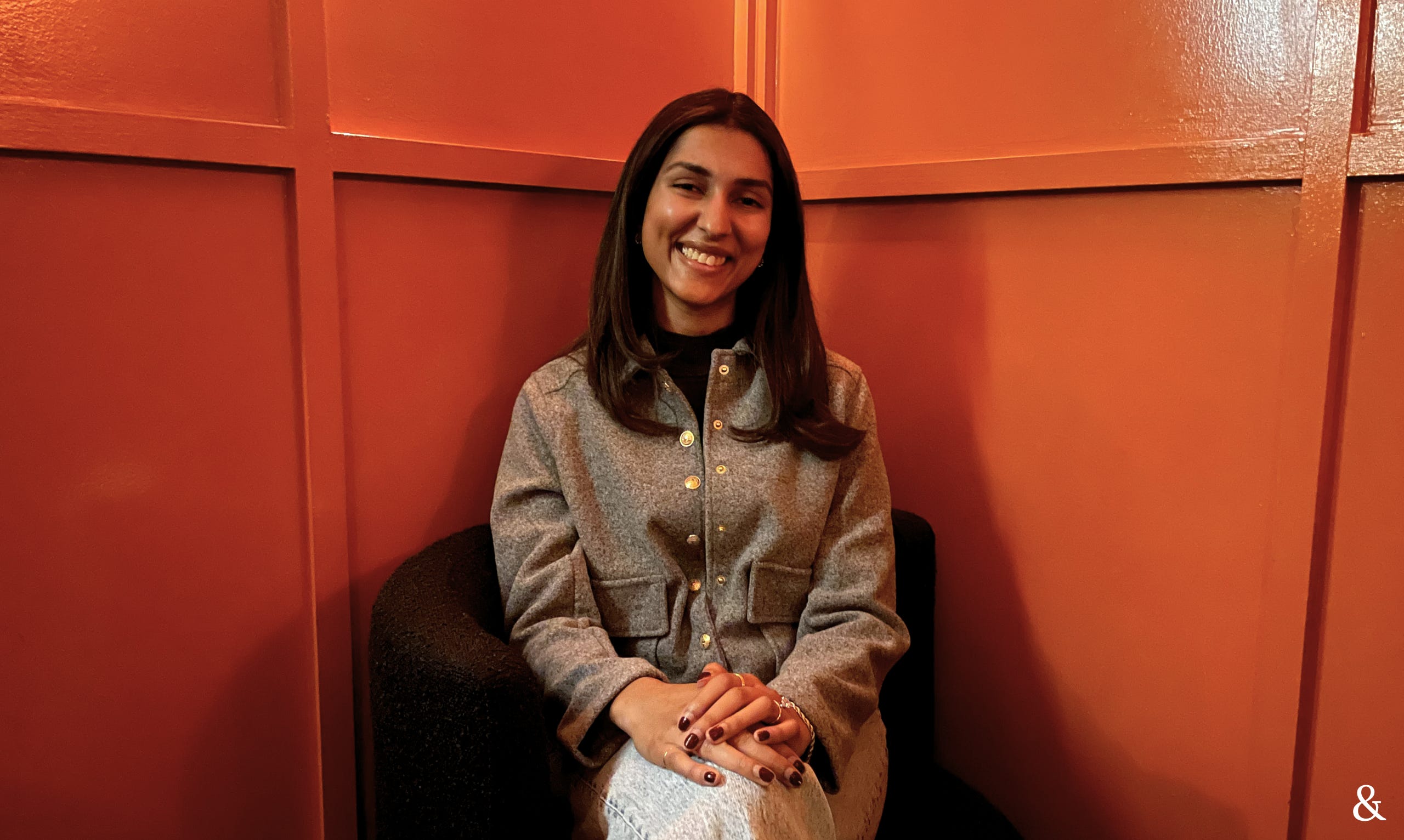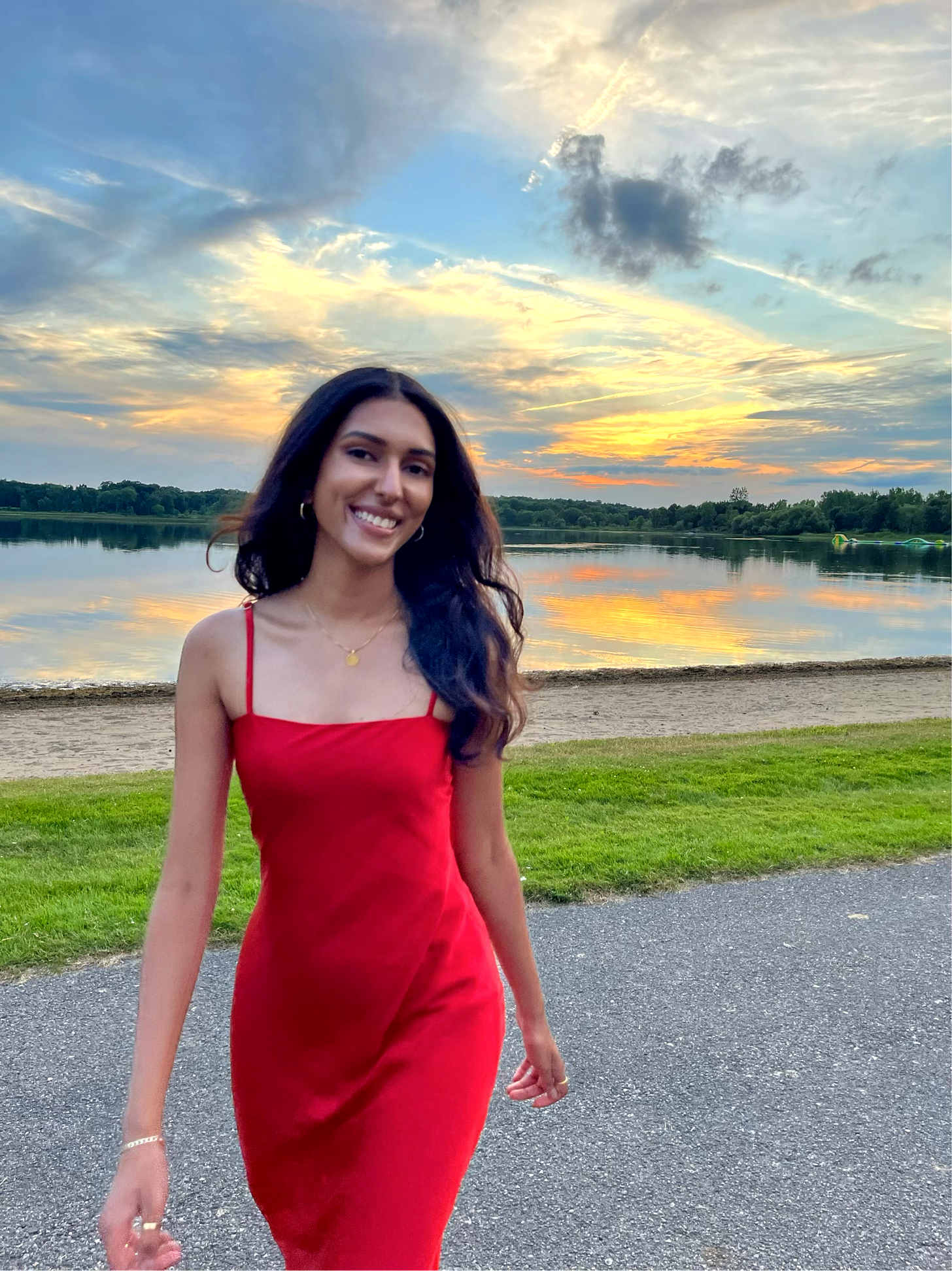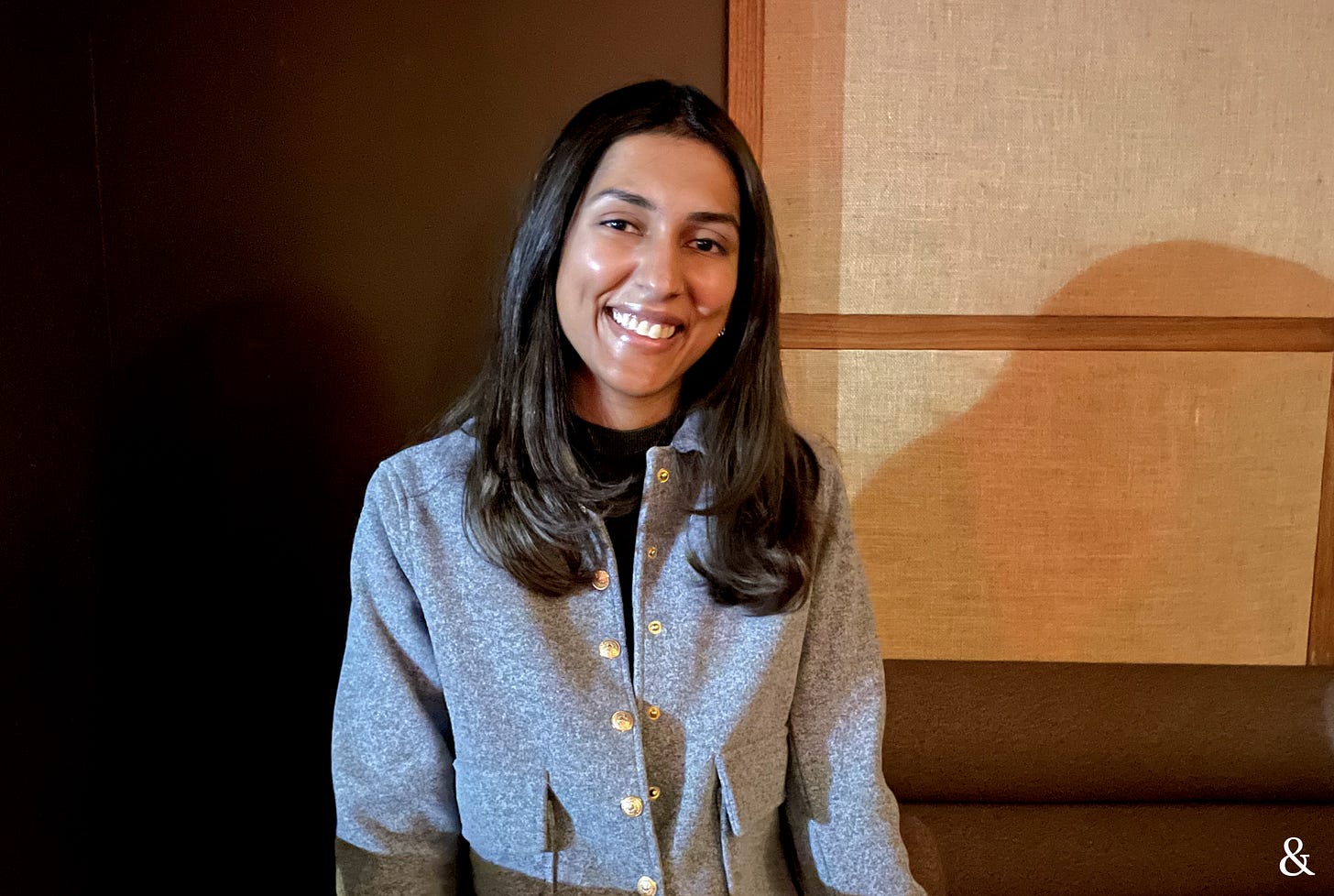On living and loving life with Abi Suresh
Meet Abi Suresh, a human living and loving life in New York City. Driven by fostering community, Abi co-hosts Olive Tree Writing Club, a weekly writing community for writers of all experiences.
Meet Abi Suresh, a human living and loving life in New York City. Driven by fostering community, Abi co-hosts Olive Tree Writing Club, a weekly writing community for writers of all experiences. In this conversation, she shares how her immense curiosity and deep passion for community was fostered by a pivotal time living abroad in Rome, Italy, before entering the full-time workforce, which fundamentally shifted and changed how she now approaches navigating and balancing the American ideal of striving for success. While she doesn't claim to have figured out the "right path," she's enjoying the experience of exploring and learning about herself and the world through lived experience.
Interviewed on December 2023 | This conversation has been edited for clarity and brevity.
Introduce yourself and tell the audience what you want them to know about you. I'm Abi. I'm an eclectic mixed bag of a person. I recently discovered that the world is really big in the last year, so I am having a moment where I don't have an identity, but everything is my identity. It's been a really fun, cool time of random stuff. I want people to know I try everything, am open to everything, and love learning new things.
What things have you loved learning recently or just had fun doing? I run a writing club, and I'm obsessed with it. It's called Olive Tree Writing Club. We meet every week on Wednesdays at 7 PM in SoHo. And it has changed my life. I started as an attendee and became a co-host with my friend James. It's been incredible to see how it's grown, so that's a big part of my identity.
I also recently revamped my blog called Verbinding. I've recently started learning to sketch, paint, and make video games. I don't know how to code, but I am learning. I've been deep-diving into everything coffee: roasting, brewing, new tools and techniques, harvesting, and geography in how it affects flavor. I've been learning Veena, which is like a really old Indian sitar-type instrument. I'm really into fashion, so I'm learning more about textiles. I've gotten into this rabbit hole about math recently. I was never a mathematician growing up, but man, math is cool. But more so about the whole concept that math is fake. Oh boy, conspiracy theories?! laughing Yes, I love conspiracy theories!
It sounds like you love doing a ton of things, and you have many things going on right now. What compels you to want to learn and try many things? It's New York City. And I know that's so corny because everyone's like, "Oh, the city of opportunity, the city never sleeps." But it's really just that. Ever since I moved to the city, something in me clicked. I met just the coolest people that do the weirdest things. Everyone here is so intelligent and so open. It feels like the world's your oyster here. I've fully embraced that personality. The city is so inspiring with its people and all its opportunities. It's been really great.
You mentioned a time before New York City—can you walk us through what that transition was like to the city or what life was like before you moved? I can start from the beginning. Before, I was living in Baltimore for four years.
I loved the city, but like man, it was difficult to live in because it's so small. It was quite drab, and it felt uninspiring. I was going through the motions there, working for two years and doing my MBA for another two years.
But then I got a job and moved to New York City; I didn't feel anything about it. A lot of people are like, "Ooh! New York City, Yeah, I'm so excited!" But I had this conception that New York City people are really hardworking, which they are. And you're going to be in FiDi and working crazy hours, then you go home and do the whole thing where you go out, go back to sleep, and that's your day every day, and I was prepared. I was like, "Yup, I'm going to work my ass off, go to tech mixers, business meetups, and network and climb the corporate ladder."
I came [to New York], and I ended up going to a lot of tech mixers, entrepreneurial meetups, and stuff like that, but it always felt really weird and inorganic. I didn't fit in, and it felt forced. And so, I was like, "Okay, I'm gonna do that, but also try and explore other communities I'm interested in."
I knew writing was a big interest of mine, so I was like, "I gotta find a writing club in the city." I went to Book Club, the bar in East Village, where they used to have weekly or every few weeks writing sessions that were free and other workshops. In the end, people can hang out and talk.
I had never met people like the ones I spoke to at Book Club. It's not because they're like, "Oh, I'm like the CEO of this company or whatever." It's like, this person was a full-time actor. This one person quit their cushy investment banking job to build realistic models of architectural icons around the world out of toothpicks. It's just like, "Man, you do that full-time? For real?" And it's also fun for them.
I had this awakening that night [after the first workshop], and I remember walking home, and I was like, "The world is so big." I had no idea. I did know, but I had no idea up until now. It was crazy, and I woke up the next day; I canceled all the other mixers I was planning for.
I was like, "Why am I forcing myself to do something I'm not interested in?" And I reached out to those people I met and exchanged information, and was like, "I want to learn more about you. I love you in a non-weird way, but like tell me more. Start from the beginning, and I want to learn more about you."
That's how everything started. Then, it just really got out of control from there. I kept meeting more and more people and learning more and more about how big the world is. Now I'm like this crazy person that's just like, "Let's do everything."
Was it living in Baltimore and the contrast with your experience in New York that kicked off the way you explored the world? Before Baltimore, I lived in Rome, Italy, for some time. First, it was a study abroad program for a couple of months, and then it turned into me being employed by my college as a student liaison in Rome.
I was in Italy for a while. And you know what my personality is? Italy is my personality, I would say. laughing I'm so annoying with it, but I met this 85-year-old Italian grandma, and she changed my entire life; it's like a whole "eat, pray, love" thing, but in real life where she was like everything to me.
We spent every day together. She's my best friend, mentor, and guide, and she showed me everything about life. If you've ever been to Italy, you know that everything feels just so romantic—like even in the movies. You can't even take a picture in Italy without it looking like it's straight out of a romance film from 1920.
That's what it feels like in person to me, too. European culture, in general, is very different from American culture. It's more community-based and laid back, and it's more surrounding the fact that you have your family and friends and spend time with them. Career jumping, career climbing, or working hard in your job—all that stuff is not as important.
What's important is taking care of yourself and others, eating good food, and drinking good wine. That's what life is about. Is it everything opposite of American culture? Yes.
It was crazy because it was my first time traveling alone without my family. It was such a formative experience, especially spending time with nonna, the grandma that I met. It was just incredible. I returned from that trip and remember being like, "I get it. This is who I want to be. Like, I don't think that life is about your career."
Unless that's what you're really passionate about, that's great. But for me, I don't, when I sit and think like, what do I want to do with my life? It's not like I want to be the CEO of this company. It's more like I want to make memories. I want to make lasting relationships. I want to try good food, and I just like helping people. So, I had that for some time, and then I think American life kind of wore down on me again.
I want to make memories. I want to make lasting relationships. I want to try good food, and I just like helping people.
And then you returned to the States after that period in Rome? I came back and lived in Michigan, where I'm from, for a year. I got an entry-level job that didn't pay much, but it was a salary, and I had never really made a salary before, so I was like, "Wow, that's cool." I was also living at home because my parents were there, so I saved a lot of money, which I'm really grateful for. And yeah, making money for the first time and having that independence.
Then I was getting into this grind of people around you telling you that you're supposed to want to climb the ladder; you're supposed to want to improve your professional skills. And I'm like, "Okay. Got it." Keep going down that path, keep moving jobs, and get higher pay and better titles. And you get into that grind, and it goes into a couple of years, and it's just like, "Okay, this is what life is."
At some point, did you go to get your MBA? So I worked for three years. And then I met my friend, Veron. I was working in Baltimore and working hard at this job. Our class of summer interns came, and one of them was this guy [Veron] who was directly reporting to our team.
He wouldn't do his work so I went to confront him and found that he was reading Letters to Shareholders. Specifically, he said, "It's really important to know how to invest and have financial literacy."
"I'll make a deal with you," he says, "I will help you invest and better understand financial literacy if you do my work for me this summer." And he's only a summer intern. I was like, "Okay, deal."
I think meeting him and hearing him talk about this, I could immediately tell he is a savant at investing in finance. He will be humble and deny this, but he's very good. And I was like, he's got something going on. I feel like this is important.
He was actually at Johns Hopkins doing his MBA—so he's a graduate intern. So he told me more about why he's getting an MBA and what he's doing at Johns Hopkins specifically. He's like, "I think a good move for you would be to get your MBA." And so I trust him with my life to this day. I got my MBA after that.
Do you think pursuing your MBA was because you felt you had to level up your career? Or was there some other reason behind it? That definitely was it. I wanted to first get out of the company that I was in [at the time]. I was not happy; it was not fulfilling. But see where I could be, and I was really interested.
At the beginning of my MBA career, I was like, "Oh, maybe I'll be a consultant or go into investment banking." That died out really, really quickly, so thank God. Then I pivoted and was like, "Yes, I want to do it. I want to be in big tech. I want the name brand of working for Google or Apple or whatever it is." I just wanted that validation of, "Oh, she's smart. She knows what she's doing. She got an MBA, and then she went and worked at Google. That's crazy. Good for her."
I didn't even care about what I would do there or why I would want to do it. Again, this whole Westernized concept that it doesn't matter: just get there and do it; nothing else matters.
I felt completely brainwashed. In my first year of my MBA, I worked like a dog. I worked hard and wanted to get that four-point [GPA]. And I did all my projects and all this stuff to get that all on paper.
Then, I started dating my now fiancé, and he was the one who helped me realize that none of this matters. And that, no offense to anyone who has an MBA, I have an MBA. It's a fake degree. It doesn't really matter.
And he's like, "Whether or not you get a four-point [GPA], whether or not you get an A's on projects, whether or not you are the president of all these clubs will not matter, just do your MBA, you get the name at the end of your title, and then you can just do whatever you want. Just relax, have fun, and network. The people are the important part."
So, I relaxed heavily to the point of the complete opposite end of the spectrum, where I did nothing for school. I did that and then graduated with a 3.9 [GPA], which is crazy.
But it worked out really well. At the end of it, the market was starting to crash. I did an internship at a FAANG company in the middle of my MBA, as most people do. I was like, "Okay, now that I have this big tech name under me, I will get a job at Big Tech somewhere, and I can do it." It's not true. It was hard to get jobs, and I tried when I graduated in May 2022.
It was difficult finding a new role because no one wanted to hire me. I was applying everywhere. I ended up reaching out to one person in my MBA [program] who had a connection and ended up getting my first job [post-graduation], which was the only offer I had. So I was like, "Okay, well, I guess I'm stuck with this. Like, let's just make the best of it."
Coming to the present day, where's your head now? You spoke about embracing life in a way where your career doesn't define you, but it sounded like it did pretty recently in getting your MBA and switching careers. Yeah, my career did define me. To your point, this is what society tells you; this is what the culture and tradition of your upbringing tell you. You put your sense of worth and esteem into that, which is very toxic, but it's also hard not to do that.
I'm speaking from a very high place of privilege right now to say, "Yeah, go explore the world and do whatever you want." But many people, or most people, are not in that space to do that. I got very lucky.
If life didn't take me to New York City, if I didn't happen to be at Book Club Bar, and if I didn't meet those people and these experiences, I very well could probably statistically be on the same route. I would be a manager, director, or vice president of whatever company I don't care about. But it looks really good, and my parents are proud of me.
It was also a huge wake-up call to me that this is very much a small chance of luck, and I could not be more grateful. I can't believe I made a last-minute decision that night and decided to go to Book Club and be like, "Let me try this writing community because I'm bored of all these mixers." And [those choices] literally changed my life. My life completely pivoted from that. To anyone in this situation, I think you make your own luck.
It's hard. I can't prescribe a one-size-fits-all, "Yes, go try everything!" But definitely don't be afraid to make your own luck and get out there; try something you've been wanting to try. You'll never know who you'll meet or what you'll experience. Don't discount anything.
I think you make your own luck. It's hard. I can't prescribe a one-size-fits-all, "Yes, go try everything!" But definitely don't be afraid to make your own luck and get out there; try something you've been wanting to try. You'll never know who you'll meet or what you'll experience. Don't discount anything.
While you're emphasizing a lot of the "well, I just happened to do something," there's a nugget in there that you're dialing down for yourself because you're very humble, Abi. Your intuition of knowing that you wanted more drove you to go and be open and try out Book Club. Because there are a lot of reasons for us to say no to things like "No, I'm tired. No, I don't want to go. etc..." Instead, you decided, "I want to try this thing and let me go and see what happens. It's a nice way to open ourselves up to more opportunities.
I often like to think that luck involves a lot of preparation and the right timing. While some things are truly systemic hurdles or boosts where life gives more opportunities to folks who are of a certain gender, ethnicity, or socio-economic status, there are moments where, outside of the system, being a little bit more open to wanting to experience things that are afforded to you, does continue to open doors or even ever so slightly. Yes! *chefs kiss*
To summarize our conversation, why does approaching our lives more openly or just trying matter to you? And why does having a non-linear "let's not climb the ladder" kind of journey matter to you? I've discovered much about what's important to me, what I value in other people, and who I want to surround myself with. In the beginning, New York City is very overwhelming in the sense that you want to do everything, like meet everyone and do everything. And I used to be such a "yes" person. I still am. Now I have a very curated group of people called Verci, and people outside of Verci that share a lot of those [similar values]. I think those kinds of people are just like multi-hyphenated people.
I want to do all the things and just share that similar mindset. You have to be careful with your time. Time is the most precious asset. I don't regret all of the time between Italy and now. But I mean, if you're reading this and you're at that point of your life, I think the best thing to do is: don't wait, like, just go out there; life is short, and it's time. Now is the time to do it.
…I think the best thing to do is: don't wait, like, just go out there; life is short, and it's time. Now is the time to do it.
Are there any other misconceptions you want to chat about? There's a huge stereotype around non-corporate climbing people or people who don't work for big-name companies, especially in the US and New York City, that you're not ambitious or intelligent. I find that false. The most intelligent people that I have met are not people who work for Google and Apple or like our investment bankers at Goldman Sachs. They are the people who make architectural buildings out of toothpicks. It's being surrounded by a community of New York City where many multi-hyphenated people do all sorts of things.
Seeing the different forms of intelligence and ambition is cool. People are just really cool. I love people. And I think it's a huge misconception that I want to stop.
People who are passionate about something are very smart about that topic or thing. You don't have to be smart about everything, but that intelligence comes with a lot of passion and determination around a topic you might genuinely love. You might be dumb when it comes to street smarts, but you might be so intelligent with the books or whatever it might be. It doesn't mean you're not a whole person, but there are parts of us. There is no one definition of intelligence.
It's a big identity with people who are Westernized that you have to be productive all the time.
The definition of being productive is subjective, and the definition of being productive all the time is also subjective. I think that's wrong and very toxic. I used to think that if I was not doing something at all times, and if it was not productive, it was a waste of time. It was especially hard; even to this day, I'm still struggling with that.
With so much stuff going on, you can sit and do nothing or sit and have a little mini-spa day. Just walk around or have a coffee. It's okay. I recently read something where they describe time as a medium in which our life unfolds rather than a resource we always have to utilize to do things in life. When you start thinking of time as a medium instead of a resource, then your concept of "wasting time" is no longer relevant, true, or valid. Because it's exactly that, it's just like time is meant to be. It's just time. You do what you need to do at that moment. Take care of yourself. Sit and stare at a wall for an hour. No time is wasted if it's what you want to do. If it makes you happy or other people happy, just do it.
When you start thinking of time as a medium instead of a resource, then your concept of "wasting time" is no longer relevant, true, or valid. Because it's exactly that, it's just like time is meant to be. It's just time. You do what you need to do at that moment. Take care of yourself. Sit and stare at a wall for an hour. No time is wasted if it's what you want to do. If it makes you happy or other people happy, just do it.
Similarly, Kirk Fernandes, a recent guest on west & ease, talks about treating our bodies and minds like how athletes approach performance. They need rest to do what they do. It's good to chill out for a bit and allow time to pass because time won't pass without you. The more we fight it, the harder it will be because it's a mental thing we must work towards.
I have this motto that I want to make every day of my life memorable, but that doesn't mean I have to fly out to Bali and make a trip every day. It's more like I could be sitting at home, and I smell the scent of a candle that is so yummy. And I'm like, "Wow, I love life. I love the smell of plums. Like, wow, amazing." That's also just so beautiful because it's enjoying life itself. We can enjoy both really big moments and everyday moments.
Do you have any advice for a past you that you want to share your thoughts with? Can I just say, "Stay in Italy?" laughing No, I don't think that's the right answer. I think what happened was meant to be happening in the time frame it was supposed to happen. I don't think staying in Italy would have been the right move because I would never have come to New York. New York City is a big formative part of my life, too.
One piece of advice I'd give my younger self is to just "Be open." I was in a different phase of needing this advice at all points in my life. I was very competitive and focused on specific things when I was younger. In college, I was also very focused on partying and making friends, and I thought that was the thing to do.
Even in my time in Baltimore, working and stuff, I was very narrow-minded. I had one specific goal, and I wanted to reach that goal. It's great to have goals, but I think if I could tell myself to be more open and to experience life and just take it as it is and think it's just a beautiful thing and it has so much to offer and don't shut anything else out, that would be very helpful.
I think I'd be in a very different place right now, but I love where I am right now, so it's good.
Give us a list of three things you'd recommend. You choose the topic.
Tuesdays with Morrie by Mitch Albom
"Formative!" is the word I would use to describe this book. He's a damn good writer, which makes sense because he was a sports broadcaster. It's a real story and memoir about him and his teacher in graduate school. His teacher found out he had some terminal illness and he was going to die. And everyone was sad, but he was just like, "No, man, let's party, rage, and make memories." The whole book follows the premise of the quote that goes like, "You learn to live when you learn to die." It's the most heartfelt, beautifully written story of this older man who just had such love for life and was ready to go. He imparted all this wisdom and positivity to his students. It's a short read, and it's so nice. I read this book before I met Nonna, but it reminds me of her, especially about living and loving life.
I used to dabble in classical piano back in the day. This is my absolute favorite classical song from the Romantic era. When I first heard it, I cried. Well, I still cry at this song. It's a beautiful masterpiece of a composed song that I can't even describe. It felt very fitting when I first listened to it. I felt like I was going through a lot, and listening to this made me feel like, "Wow, life is worth living. This is great stuff." Like, no words to this song.
Nationwide Commercial with H.E.R.
It's very deeply emotional for me. I really like H.E.R. as an artist, and I like it when they show montages of their day-to-day normal lives. Those two things, put together, just make me so emotional. I love people, I love life, and I love music. It's all beautiful things combined.
Favorite song or song you have on repeat at the moment?
"I Know" by Travis Scott
I recently went to a Travis Scott concert, and it was transformative. Seriously, I cannot stop thinking about the beat and energy. And the way Travis Scott performed, he showed up and brought it like I have never seen in my life. He knew how to get the crowd going.
Enjoyed the Conversation with Abi Suresh? Learn more about Olive Tree Writing Club, which Abi co-hosts @otwc_nyc on Instagram. You can also follow her writing at www.verbinding.org
Abi is also passionate about giving back to The Bowery Mission.
The Bowery Mission exists to promote the flourishing of New Yorkers overcoming homelessness and marginalization by providing compassionate services and a transformative community. A donation was made to The Bowery Project as part of this Conversation.
You can support The Bowery Project by donating directly.













You are incredible! Thank you for telling this story so well!